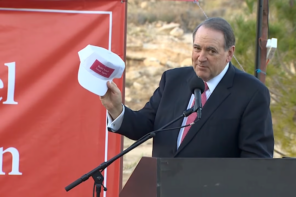Much has happened since RD broke the story last year of Project Blitz—a stealth state legislative campaign of the Christian right that framed much of their agenda in terms of religious freedom. Controversies over legislation based on model bills have broken out across the country on issues ranging from LGBTQ civil rights and discrimination in adoption and foster care, to abortion access, and teaching the Bible in public schools. The Christian nationalist intentions of Project Blitz have also received much attention, but a remarkable episode in Minnesota this past state legislative session may be a harbinger of a more profoundly theocratic politics on the horizon.
Earlier this year, Minnesota state Sen. John Marty was perplexed during a committee hearing. State Sen. Mary Kiffmeyer, the Republican chair of the Senate State Government Finance Committee, had proposed a $4 million cut in the budget for the Minnesota Historical Society that might have resulted in significant layoffs around the state. Asked by a Democratic senator why she proposed such a steep cut, Kiffmeyer said it was because of “controversy,” though she refused to say what the controversy consisted of.
Marty, following up on his colleague’s questioning, wondered aloud what it even meant to have “a secret controversy,” when one of Kiffmeyer’s Republican colleagues stepped in to explain that it was about, what he called “revisionist history” at the 200-year-old Historic Fort Snelling. There had been a flap over how the historical site had expanded its educational mission beyond the fort’s military history, to include the Dakota name for the area, Bdote, “with history spanning 10,000 years,” including “Native peoples, trade, soldiers and veterans, enslaved people, immigrants, and the changing landscape.” Some Republican legislators didn’t like it.
While the cut passed the Senate, it was ultimately blocked in budget negotiations with the house. Now, it turns out that Fort Snelling was not the only controversy on Kiffmeyer’s mind. In December 2018, Kiffmeyer along with 25 members of the Minnesota Legislative Prayer Caucus—the state action arm of Project Blitz—had written to the nonprofit Minnesota Historical Society, objecting to a talk scheduled for March 2019 by a distinguished scholar and law professor, Steven K. Green, on the theme of his 2015 book, Inventing a Christian America: The Myth of the Religious Founding. They claimed that the Society was “promoting a narrative about our nation’s history and founding that is patently false,” and that it would be “prudent” for the Society “to cancel Prof. Green’s presentation or, better yet, allow us as Christian legislators in Minnesota, to debate this issue with Prof. Green.”
(Green later recounted the episode in Church & State magazine, noting that “the Caucus objected to my upcoming lectures, calling my book biased and one-sided—though admitting they had not read it.”)
Minnesota Historical Society Director Kent Whitworth replied that Green was a respected scholar (detailing how that was so) and would welcome respectful questions and dialogue. But that wasn’t good enough. Although the Prayer Caucus reiterated their demand in another letter, the program proceeded as planned. Afterward, Prayer Caucus state director, Rev. Dale Witherington, along with several Caucus members wrote again, this time demanding that the Society schedule someone who represented their point of view (which they had been casting as the “truth”) to speak or debate before “we begin reviews of the budgetary requests of the MHS.”
Witherington wrote that “we are here to encourage prayer, and to defend our religious freedom. The third pillar for the existence of our Caucus is to preserve our Judeo-Christian heritage. Prof. Green’s argument is a direct attack on that pillar. We cannot let that go. We will not be silenced.”
Sen. Marty, who is a Democratic member of the finance committee, thought it was odd and concerning that the letter came from Witherington. “The minister, who is director of their prayer caucus,” he told RD, “is not a member of the legislature, is not a state employee, and should have no control over the state budget for the Historical Society.”
Of course, the Historical Society’s quiet refusal to allow the Prayer Caucus to commandeer their program did nothing to silence them. The Caucus was free to host an event and invite whomever they wished to speak. But the Prayer Caucus was probably just following the recommendation of the 2018-2019 Project Blitz playbook. “Part of that effort is not to let those who want to run roughshod over religious liberty dictate the terms of the discussion.”
In that spirit, Witherington’s prime candidate for a counterpoint presentation, David Barton, is an influential Christian right political leader whose book, The Jefferson Lies, was withdrawn in 2012 by Thomas Nelson, the world’s largest Christian publisher, in the wake of controversy over egregious inaccuracies. Uncoincidentally, Barton is also a driving force behind Project Blitz as one of the four-member steering committee, and his organization, the Texas-based Wallbuilders’ ProFamily Legislative Network, is one of the three organizational backers of the project.
The secret controversy then, is actually that the Minnesota Legislative Prayer Caucus made good on their veiled threat: that they would axe the budget unless the Historical Society acceded to their demand to commandeer the program. That the effort to punish the Historical Society in this way failed, should not obscure the fact that they tried.
The Dominion Dimension
The episode also illuminates the theocratic context in which this diorama of retribution took place. The politics of Christian nationalism is but one part of one of the most underappreciated stories of our time: the politics of Dominionism, which a number of scholars have described as the driving ideology of the white evangelical protestant wing of the Christian right.
Christian nationalism, the idea that America was founded as a Christian nation, and that this must somehow be restored, was once little appreciated outside the Christian right and a relative handful of dedicated scholars and journalists. But it has become a fashionable reference point since Clemson University sociologist Andrew Whitehead showed that the strongest correlation with voting for Donald Trump among white evangelicals in 2016 was a belief in Christian nationalism. Whitehead’s findings are not surprising since Christian nationalism has been integral to the ideology of the Christian right for decades. It is, for example, a major focus of the political organizing manual the Family Research Council (whose president, Tony Perkins, was recently named head of U.S. Commission on International Religious Freedom).
David Barton is generally referred to as a Christian nationalist, largely because he is the best-known promoter of the idea. But as a former vice chair of the Texas Republican Party and a frequent headliner at Christian right and Republican conclaves, he is also a Dominionist with considerable political reach. (The Jefferson Lies was on the New York Times best-seller list at the time it was withdrawn.)
The Christian nationalist appeal is to, what historian Frank Lambert calls, a “usable past” that justifies the politics of the present. It suggests a transcendent purpose mandated by God and ordered by the Founding Fathers. As inspiring an idea as this may be for some, it is necessary for the Dominionist argument. After all, if the country weren’t intended by God and the Founding Fathers to be a Christian Nation, then how do they justify a theocratic agenda?
Witherington, who has been a presence in the state capitol for years, calls himself a “chaplain,” though he might be better described as a lobbyist for Dominionism—the theocratic idea that Christians are called by God to exercise dominion over every aspect of society by taking control of political and cultural institutions.
In 2015, he launched a project called RestoreMN, which he says is a mission to influence government as one of seven metaphorical “mountains” that Christians of the right sort are to conquer to achieve dominion. (The others are family, religion, business, media, education, and arts and entertainment.) He told one interviewer in 2016 that RestoreMN is about the “restoration of Biblical values in our nation” and promoting what he calls “Biblical citizenship.” He then claimed that separation of church and state “is not in the Constitution” and that “our nation was founded to be a nation to glorify God and to spread the gospel of Jesus Christ.” His mission, he said, is the mountain of government.
He explained that if one is a Christian in government, whether the president or a state legislator, “God has called you to that role”:
“as a pastor or a chaplain at the state capitol, one of my roles is to help our state legislators who follow Christ, remember that God has assigned them the task of being a Christian in government and when they go to make laws that the laws come from principles found in Scripture. Because we want Godly laws. So that’s gonna carry over to all of the seven mountains. That’s discipleship.”
Witherington’s vision of a nation ruled under “Godly laws” notwithstanding, he claims that the Founders did not intend “a theocracy.”
But Dr. Andre Gagne, a tenured professor in the Department of Theological Studies at Concordia University in Montreal, who has studied this movement, listened to the Witherington interview and told RD that Witherington follows the pattern of some 7M Dominionists who “present the idea in soft, non-threatening terms, saying it’s just about discipleship and not theocracy.”
“But,” he says, “what discipleship really means to them is about bringing not only one’s life—but one’s nation—under the lordship of Jesus Christ.”
At times, Witherington’s mission sounds more like the leader of an expedition for colonial conquest than a lobbyist seeking to influence legislation. Citing Biblical passages, for example, he declares that God says “we are citizens of Heaven… sent to be Ambassadors to Earth.” He says this “means we have been specifically sent by God to this place to this location to whatever our jobs are… To plant the flag as Ambassadors, carrying the message of the Gospel in the sphere of influence God has placed us in.”
Since 2017, he has, according to his LinkedIn profile, simultaneously waged his RestoreMN project while also serving as the state director of the Minnesota Legislative Prayer Caucus, and as director of community engagement for the Minnesota Family Council, the state political affiliate of the Family Policy Alliance and the Family Research Council.
Since the Minnesota Legislative Prayer Caucus is but one of 32 state prayer caucuses organized by the Congressional Prayer Caucus Foundation to carry out Project Blitz, it could be that the drama of the Minnesota Historical Society will be the exception. But given the unambiguous intentions of the organizers of Project Blitz, the efforts to replace the facts of history with the ethos of Christian nationalism en route to conservative Christian dominion is much more likely.




